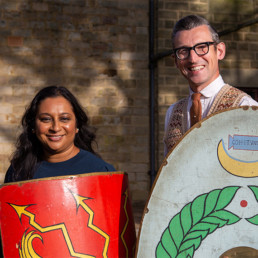
Written by Raksha Dave
Raksha Dave is an archaeologist, broadcaster and president of the Council for British Archaeology, within which also sits the Young Archaeologists Club. Raksha also works with arts organisations to help them find ways to encourage diversity and inclusivity in their environments.
When people ask me about how we can make archaeology more welcoming and inclusive, I often think about my four-year-old self. I was obsessed with dinosaurs and begged my mum to buy me a book about them. It opened my eyes to a new world. I still have the book. I found a world that I obsessively wanted to discover and felt as much right as any child to do so.
My teachers encouraged and supported my passion, fueling my interest through their teaching. No one ever doubted I could be an archaeologist. No one ever said that this was a profession where, even as recently as in 2020, 97 per cent are white.
The next generation of brilliant archaeologists aren’t teenagers, they’re children. We need to engage them in the subject, but we’re failing. The profession needs to do better at communicating that archaeology isn’t just about ditches and digging if it’s to widen its appeal.
Archaeology is about the remains people leave behind whether that was an hour ago or 3,000 years ago. When any child opens their door, they are immersed in an archaeological environment: old signs on the sides of buildings; windows bricked up; changes in the architecture and age of buildings; and old boundary markers. There is so much to discover just on our doorsteps which can shed light on the past.
Excavation can mean researching an old camper van, recording the objects left at a refugee camp in Calais, or researching a World War Two encampment. Archaeologists are even researching the remains of contemporary music festivals which can help us understand more about people who lived – and feasted in the past; like our prehistoric ancestors at Durrington Walls, near Stonehenge, more than 4,500 years ago.
Archaeology is also about rethinking our past. I’ve just been working with BBC Teach on a new Live Lesson for primary schools about the Romans. Filmed on location at Vindolanda Fort, on Hadrian’s Wall, it’s about discovering who might have been living at the Roman fort. We think of forts as simply military settlements to defend and protect, but that wasn’t true in Roman times. Forts were actually attached to large settlements with people from all walks of life. The military would bring their families, and lots of traders would be attracted to the settlement to sell crafts, food or offer services.
The Live Lesson sets children a mystery to find out why objects like a toy wooden sword and a luxury Roman shoe have been found at the site (you’ll have to watch the programme to find the answer). I hope it encourages children across the country to become more curious about the past and helps them to relate to the people who lived at Vindolanda. Seeing ourselves in the past, being able to discover and experience people’s lives through relatable objects like shoes, toys, hair clips and jewellery enables children to make a direct connection to their own lives.
As well as seeing ourselves in the past, archaeology also needs to shrug off its dusty academic image. It is a multi-disciplinary subject which spans the humanities and sciences. It really is accessible to young people through apprenticeships as much as through degrees.
Almost all of archaeology in the UK is undertaken by commercial organisations. Their focus is on planning and building infrastructure. From new houses to railways, archaeologists work alongside civil engineers and planners to help these projects come to fruition. More than 200 archaeologists worked on the Crossrail project, discovering tens of thousands of artefacts of significant importance.
Any child should feel that archaeology is a profession, or an interest they can nurture, where they can feel they belong. Demystifying the topic, helping them understand it can happen on their doorstep, and showing how very diverse our past is, can help children to see themselves in archaeology and feel curious to know more.
The Romans – History Live Lesson is available to watch on BBC Teach. For more information and teaching resources, please visit: https://bbc.in/3tx4uWx

